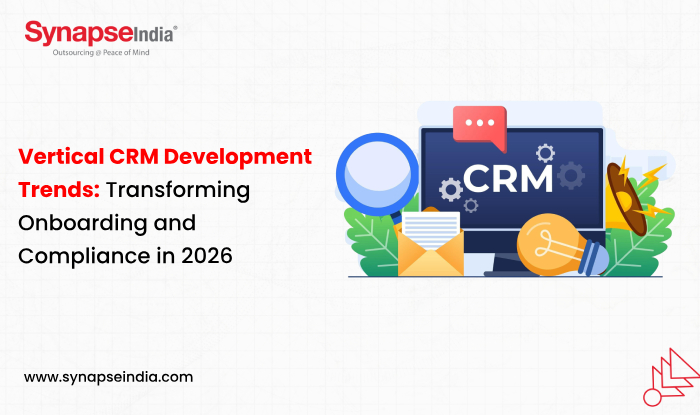 07 Nov 2025
07 Nov 2025
The CRM market is projected to reach $81.20 billion in 2025 (Mordor Intelligence). Entering 2026, vertical CRM development is moving toward industry-focused systems that simplify onboarding and reduce compliance-related challenges.
Whether in healthcare, finance, or retail, these changes are redefining how businesses operate. We see a growing preference for CRMs that address specific industry needs with smarter features and stronger integration between onboarding and security.

Vertical CRM focuses on solutions built for one specific sector, such as real estate, healthcare, or manufacturing. Unlike general-purpose systems, they are designed to match the unique workflows and regulations of each industry. In 2026, these CRMs are expected to include:
Python continues to play a key role in vertical CRM development because of its flexibility in managing complex workflows and data pipelines. As a result, industries get systems that fit their operations right from setup.
Onboarding processes that once took weeks are now being completed much faster. With AI-led guidance and workflow automation, vertical CRM trends in 2026 are making the experience smoother for both businesses and users. Here are some key improvements:
These improvements not only save time but also improve user retention. When systems are intuitive, employees adapt faster and stay more engaged.
Compliance is now integrated into the structure of CRM systems rather than added later. In sectors where regulations are strict, this approach minimizes risk and improves confidence in operations. Important developments include:
Reports from leading firms show that businesses using industry-focused CRMs experience better data security and higher customer trust. Compliance-by-design is becoming a must-have for every regulated industry.
The global CRM market is heading toward $112 billion in 2025 (Fortune Business Insights), and the demand for custom-built systems continues to rise. Industries in the USA need tools that fit their processes instead of forcing them to adjust to generic software. Key reasons include:
Custom builds help organizations save time, reduce workarounds, and focus more on customer experience rather than system limitations.
We understand that each business requires unique CRM features that fit its operations. At SynapseIndia, we specialize in Python-based vertical CRM development that simplifies onboarding and strengthens regulatory alignment. Our team provides:
By combining technical expertise with industry understanding, we help businesses in the USA achieve long-term efficiency through smarter CRM systems.

Vertical CRM development is shaping the future of how industries in the USA manage customers and compliance. The move toward modular, AI-supported, and secure systems is creating faster onboarding and better data control.
At SynapseIndia, we continue to build solutions that reflect these trends and support our clients in staying ahead. The future of CRM is not general—it’s focused, efficient, and built for growth.
It refers to CRM systems built for specific industries, focusing on processes and rules that are unique to that sector.
It varies between $50,000 and $300,000, depending on complexity, features, and industry needs.
Healthcare, finance, retail, and manufacturing see the highest impact due to specialized operations.
Choose custom if your workflows are unique; ready-made tools fit simpler business setups.
Most projects take 3–6 months, depending on scope and additional onboarding or audit features.

